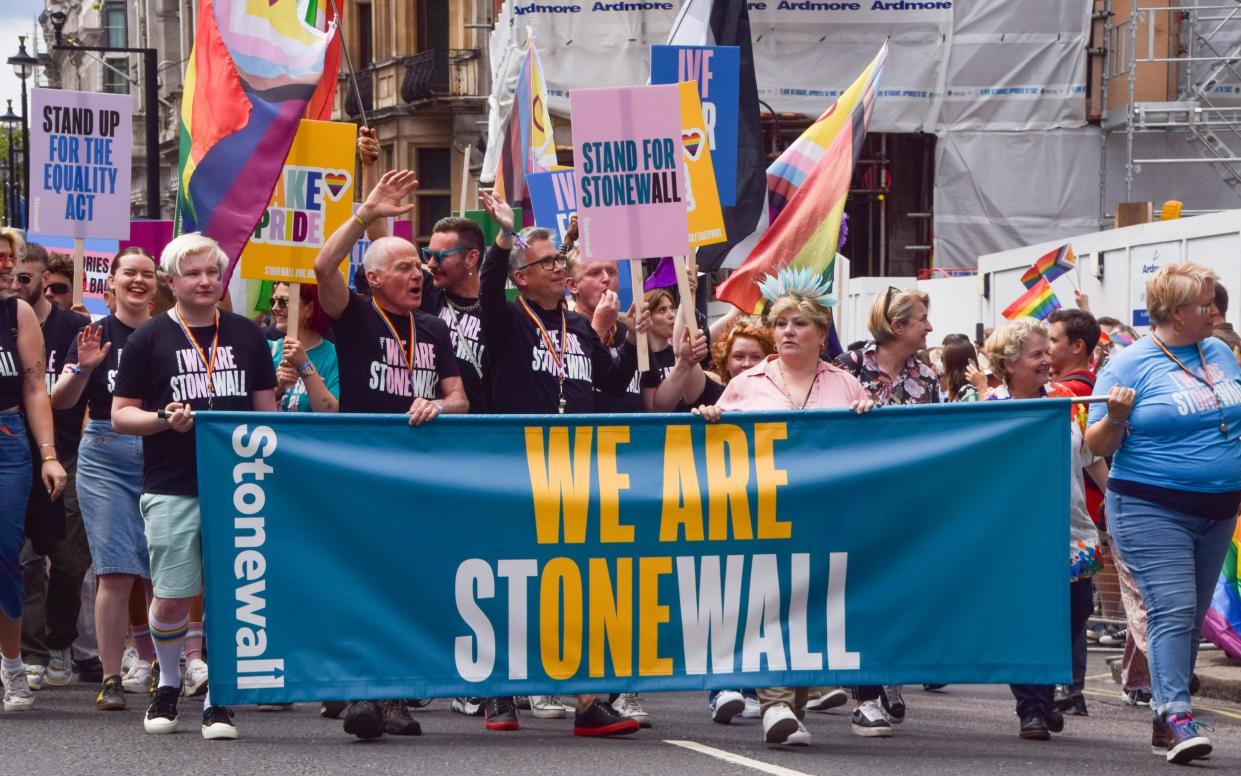The truth about Stonewall is finally being exposed

- Oops!Something went wrong.Please try again later.
It has not been a good week for Stonewall. First, the charity was blamed in the Commons by MP Dawn Butler for leading her astray about the methodology of the Cass Review. As she apologised for having “inadvertently misled” the House about the number and quality of studies surveyed in Cass’s final report, she explained she had been “quoting Stonewall’s briefing”.
Meanwhile, web administrators were making changes to the organisation’s own published response: parts that had originally cast doubt on Cass’s survey vanished. And just as Butler blamed Stonewall, a briefing of theirs now appeared to blame others, describing “early analyses of the Cass Review” as having made it “unclear how and why research had been graded”.
Last week, other analyses were being spread by amateur transactivists on X/Twitter. Subsequent investigations by health journalists in the US have traced the source of the misinformation back to two social media accounts, one British and one American. Neither of them has a professional medical background.
Still, a much higher standard is expected of an organisation only recently considered to be the leading expert in Britain on transgenderism. Some will find it grotesque that it inherits its position on complex medical research about children from unclear “early analyses”. But for seasoned observers, this comes as no surprise.
For years, Stonewall has placed itself in a bubble, obdurately ignoring concerns and demonising reasonable critics, and so leaving it vulnerable to the credulous acceptance of nonsense emanating from fellow tribe members. The only surprise is that it now looks as if it might finally be held to account.
While the organisation has embraced the full gamut of transactivist causes – self-ID and puberty blockers included – those who challenged it were dismissed by activists as “transphobes”. Surfing a tide of public goodwill, public money, and strong government connections, those in charge of the organisation apparently saw no need to win the debate, instead opting for the strategy of saying there wasn’t one to be had.
But it was in 2018 that this strategy really took off. Urged on by Stonewall, the Government launched a public consultation about updating the Gender Recognition Act in favour of self-ID. When grassroots campaigning organisation Transgender Trend published a schools pamphlet prefiguring much of the cautious approach to social and medical transition of children now endorsed by Cass, Stonewall Scotland branded it “dangerous”.
Also in 2018, when BBC Woman’s Hour attempted to run a series of debates on the tensions between transactivist demands and women’s rights, then head of trans inclusion at Stonewall refused to be in the same interview as her proposed sparring partner, journalist Helen Lewis.
Later, the next head of trans inclusion, Kirrin Medcalf, was writing to the chambers of lesbian barrister Allison Bailey – someone concerned about placing males in women’s prisons, and the fate of young lesbians caught up with gender ideology – accusing her of “actively campaigning for a reduction in trans rights and equality”.
Appearing at Bailey’s subsequent employment tribunal, Medcalf requested the soothing presence of his mother and a support dog, and claimed, the term “terf” could not be a slur because it was used by a powerless minority group, trans people, about those (feminists and lesbians), who they deemed transphobic because they “deny trans people’s lived reality”.
It is astonishing that this stark insight into the cult-like mentality at the heart of Stonewall did not destroy its credibility on the spot.
But it seems that the world is finally catching up. Former Stonewall boss Ruth Hunt recently said in an interview that the only regret of her tenure was “trusting the experts” on child transition. And yet for more than a decade, politicians, media figures, university leaders and healthcare professionals have insisted to the UK public that it is Stonewall who is the real expert in the room. Let us fervently hope they know better now.
Kathleen Stock is a contributing writer at UnHerd, and co-director of the Lesbian Project

